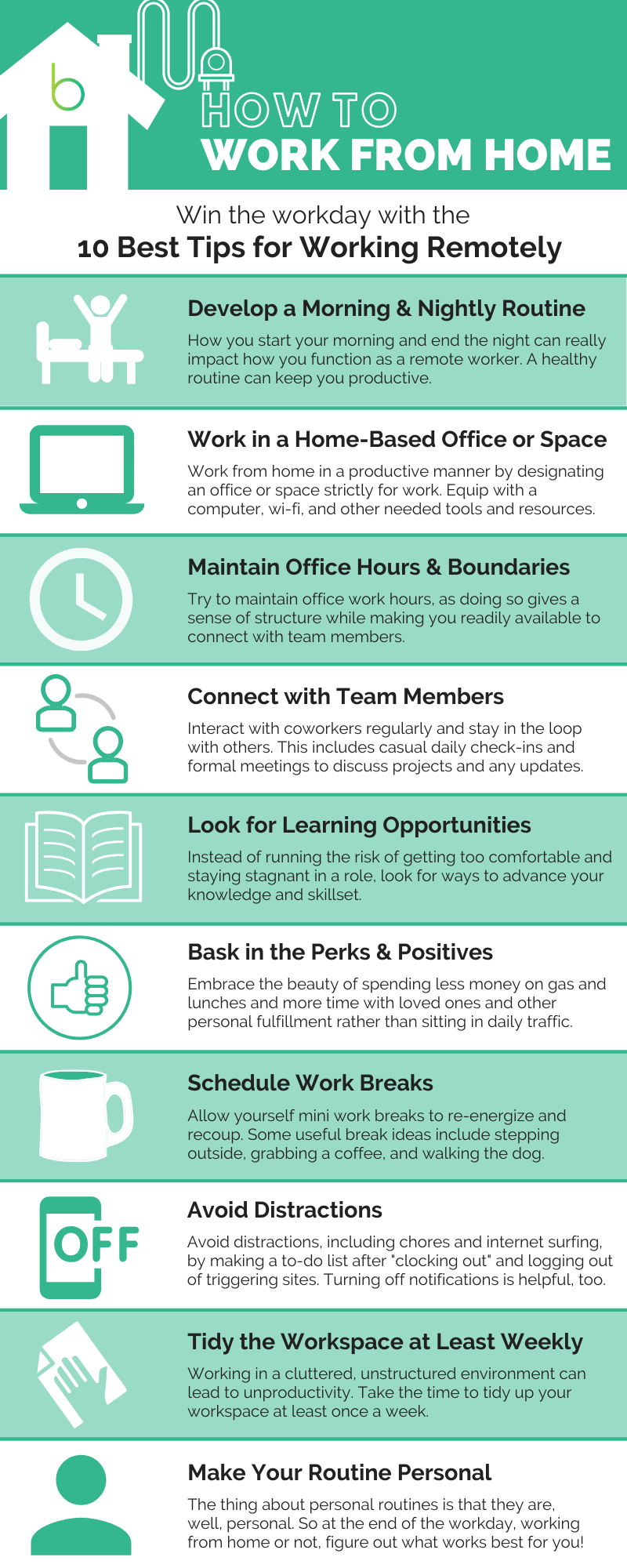Gone are the days of only wanting traditional work benefits, including health insurance, paid time off, and retirement accounts.
While those are still highly desirable, more and more employees are pushing towards working remotely. And employers are granting these wishes.
But working from home can present some challenges and temptations. Just think, no in-person communication and that new Netflix series and comfy couch calling your name…
If working from a home office, this does not mean productivity has to be negotiated. In fact, work efficiency can even be heightened when putting a routine into place.
Best Ways to Work From Home
Find out how to maximize your time, leverage work tasks, and be the ultimate employee with these tips for working remotely.
1. Develop a Morning & Nightly Routine
How you start your morning can really impact how you function as a remote worker.
And there are many morning habits to start your day right, including:
- Waking up early and thankful.
- Jotting down a to-do list.
- Making the bed.
- Drinking some water and coffee.
- Exercising and meditating.
- Taking a shower and getting ready.
Taking part in these tasks can help you step onto the right foot and stay productive.
Develop a nightly routine, too, as how you end your night can impact how you start your morning. Create a healthy bedtime routine by:
- Staying consistent with bedtimes.
- Powering down from electronics.
- Writing out worries.
- Designing a room conducive to sleep.
- Practicing stress-relieving techniques.

2. Work in a Home-Based Office or Space
One of the best ways to work from home in a productive manner is by designated an office or space strictly for work. (This does not mean on the couch in front of the latest Netflix series…)
Make sure the work space is equipped with the tools needed to complete tasks with ease and productivity in mind, including:
- Computer system and related software.
- Reliable wi-fi and phone connection.
- Standing work desk.
- Sturdy, yet comfortable chair.
Other resources that may be helpful include a calendar, whiteboard, and books. Really, gather what works best for you and your workflow.
On the flipside, likewise have more than one area for work if it leverages your efficiency. A quiet place may be exactly what you need to focus on research, while birds chirping outside might get those creative juices flowing.
If longing for more human interaction, pack up and work from a coffee shop, library, or other spaces as desired and available.
The bottom line: Try to keep work and relaxation areas separate. You do not want to feel as if work should come into the mix while trying to unwind. Keep work away from the dinner table, too!
3. Maintain Office Work Hours & Boundaries
Whether it be as a writer or for a call center, office hours can vary depending on the job.
Despite the job, though, try to maintain office work hours while considering varying time zones as needed. Doing so gives a sense of structure while making you readily available to connect with team members.
Likewise set boundaries for when you are available, as working from home full-time should not mean working around-the-clock. Try setting a time to disconnect from work like you would if leaving a regular office.
4. Connect with Team Members
One of the biggest challenges of working from home can be feeling disconnected from others, especially after the newness wears off.
Feeling isolated can start to tarnish motivation and enthusiasm towards a short-term goal or work itself.
Interact with coworkers regularly and stay in the loop with others by:
- Checking in on a daily basis, or at least trying to. Even if it means a quick “How was your weekend?” or “Did you enjoy your vacation?”
- Scheduling regular meetings, whether it be to discuss a new project or any updates.
- Using messaging and video apps, including Microsoft Teams, Slack, and Zoom. (Do not let email be the only form of communication!)
Regardless of the communication methods, be sure to do so. Formal and informal messages welcomed, including that task-oriented sheet or funny meme!
5. Look for Continuing Education & Learning Opportunities
From lunch and learns to self-learning courses, companies tend to offer opportunities for continued learning. But these can be dismissed if working from home.
Rather than getting comfortable and staying stagnant in a role, look for ways to advance your learning and skillset.
Besides, companies hire self-driven employees more times than not, so why let home walls confine motivation?
6. Bask in the Perks & Positives
Working from home tends to be a perk within itself, though there are many benefits that may be overlooked.
Just think: Working from home means no long work commute, saving money from eating out regularly, amongst the many perks.
(Oh, and did we mention gaining a new coworker AKA your beloved pet?)
So instead of sitting in traffic, do something positive with that time other than gearing right into work. For instance, make breakfast with a loved one or take a morning walk.
7. Schedule Work Breaks
Sitting in front of the computer and task at hand for hours on end can start impeding productivity, energy, and motivation. And not to mention, drive you a little stir crazy!
Allow yourself mini work breaks to re-energize and recoup. Some useful ideas may include:
- Stepping outside in nature.
- Going to grab a coffee.
- Walking the dog around the block.
- Doing a quick errand.
- Grabbing the mail.
- Putting away the dishes.
However, do not use this time to knock out a large load of laundry or clean the entire house. Participating in mini-breaks are truly only beneficial when you come back to work refreshed, not stressed about the remaining laundry you need to finish.
8. Avoid Distractions & Turn Off Notifications
Whether it be casual internet surfing or household chores, there is much to be tempted with when working from home.
But getting sucked into these distractions can majorly pull you away from work. Try to avoid these distractions as much as possible, even if it means jotting down a to-do list for when you “clock out.”
If social media and internet entertainment loop you in, turn off notifications and log out from triggering sites. Some computers and phones help manage screentime and limit certain apps, so take advantage of that as needed.
9. Tidy the Workspace at Least Weekly
Working in a cluttered, unstructured environment can lead to unproductivity.
Take the time to tidy up your workspace at least once a week, which may include:
- The physical workspace itself, wiping off any computer dust and decluttering books.
- Computer files and emails, aiming to clear or consolidate documents.
- Emails, deleting any junk emails and others that are irrelevant and unneeded.
10. Make Your Routine Personal
The thing about personal routines is that they are personal.
Whereas some remote workers thrive in a home office alone, others thrive in vibrant spaces with others.
So at the end of the workday, working from home or not, figure out what works best for you!








